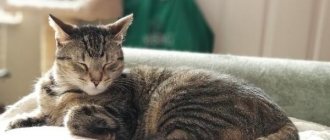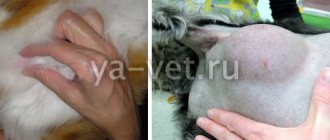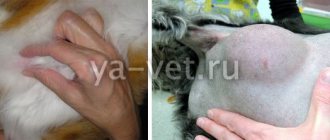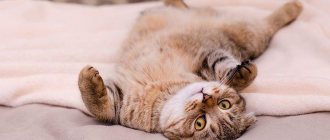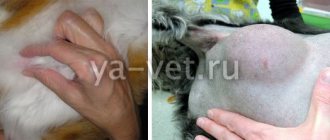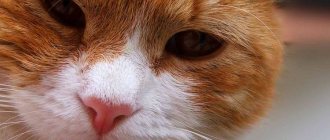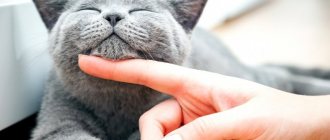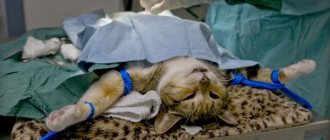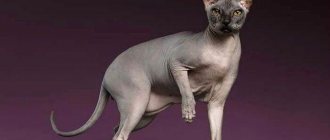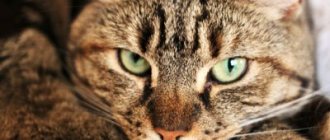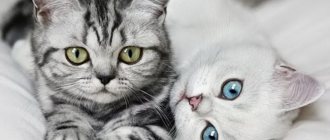The well-known “skill” of cats is purring. This is what you hear when you pet your pet and play with him. But sometimes cats “confuse” their owners with other sounds that can hardly be called “characteristic” of these animals. For example, rumbling in a cat’s stomach may look funny, but for many breeders, especially not very experienced ones, it can cause anxiety: is this phenomenon a harbinger of some serious digestive pathologies? Let's figure this out!
Why is he purring?
If you have ever experienced the feeling of “sucking” hunger at least once in your life, then you are probably familiar with the rumbling of your stomach firsthand. In such cases, this phenomenon indicates an empty digestive tract. This is how the body “hints” to its owner the need for a good meal. So it is in the case of a cat. If his stomach growls loudly, then your pet most likely simply wants to eat. As soon as you feed it, the animal will return to its favorite pastime - it will lick itself tastefully, and then sleep sweetly.
But! Sometimes a “hurricane” in your pet’s stomach indicates the exact opposite situation, that is, overeating. In the modern world, it is not uncommon for a cat owner to spend almost the entire day at work, returning only late in the evening. And it’s good if there are household members who can feed a hungry sufferer. Otherwise, the cat, having received its portion of food, greedily pounces on it, and then begins to beg for more. No wonder he overeats a lot. Grumbling and other strange stomach sounds in such situations are only a consequence of the inability of the digestive system to cope with the “happiness” that has fallen on it.
And the “roars” of the stomach are a trifle. If a cat has eaten so much that its gastrointestinal tract cannot digest it all properly, the food masses simply begin to rot and deteriorate. All this can lead to either severe food poisoning or serious indigestion. “Thunders and lightning” in the stomach of an overeating cat is a sure sign of impending diarrhea.
Aerophagia as a cause of grumbling
Another phenomenon is closely related to excessive gluttony. It's called aerophagia . Translated, this literally means “eating air.” If a cat eats greedily, he simultaneously swallows a lot of air (sometimes so much that bloating develops). Part of it comes out through belching, and the rest goes deep into the intestines, where it produces rumbling and roaring sounds. Subsequently, the air comes out quite naturally, which is why aerophagia is often confused with flatulence. But, unlike gases in the intestines, it does not pose any particular danger. So what to do? Just try to feed your glutton more often, but in smaller portions. Then the cat will not swallow such volumes of air, and the problem will solve itself.
Why does a cat's stomach growl - 6 possible causes of the problem
If your cat's stomach is rumbling, it could be due to a number of different factors. Often this condition is triggered by a feeling of hunger, but there are situations when the cause is more serious. Pathologies of the digestive system and helminthic infestation can cause rumbling. That is why it is important for the owner of a pet whose stomach regularly gurgles loudly to contact a veterinary clinic.
How are grumbling and worms related?
In the most direct way, no matter how strange it may seem. Perhaps you have seen mangy and disheveled kittens with oversized, swollen bellies? If so, then you are “lucky” to observe the main visual sign of toxocariasis: a swollen and pear-shaped abdomen with severe general exhaustion of the pet. You can easily verify this by stroking the animal in the chest area. You can easily feel the ribs protruding from under the skin. A sick kitten often has diarrhea, and the excreted feces have a greenish-yellowish color and an unbearably disgusting smell.
So here it is. Such signs indicate a very serious, generalized helminthic infestation. At the same time, there may be many dozens and even hundreds of parasites in the intestines of an unfortunate kitten! They eat the food taken by the animal almost faster than the animal itself. As a result, the kitten's intestines remain empty, with the exception of a huge volume of gases formed due to putrefactive and other processes. To a large extent, this is facilitated by the worms themselves, which secrete a lot of toxins and other unpleasant compounds.
It is the gases moving through the half-empty gastrointestinal tract and the intertwining of helminths that are the source of those strange sounds and rumblings. As you yourself understand, rumbling is only a small part of all the problems of an unfortunate pet. And if he is not cured of the parasitic disease, he may die from severe intoxication. In addition, the balls of parasites can be so large that the intestines eventually cannot withstand their pressure and burst. As a result, death from massive internal bleeding from a ruptured intestine.
One of the signs indicating a possible helminthic disease is the alternation of constant diarrhea and constipation, and the excreted feces have a mucous consistency, a greenish-yellow color with possible red impurities of blood and a completely unbearable smell. What other reasons may be responsible for the occurrence of bowel sounds?
Treatment of intestinal inflammation in cats
Typically, treatment for inflammatory bowel disease involves a combination of diet and the use of various medications. A hypoallergenic diet is one of the first steps to verify the diagnosis. The key is to use sources of protein and carbohydrates that the cat has not eaten before, such as duck, potatoes, or use a diet consisting of hydrolyzed proteins.
Eliminate various treats and treats.
If this diet helps, its duration is two weeks.
If a hypoallergenic diet is ineffective, others are involved. Highly digestible, low-fat diets are generally better tolerated by a cat with IBD. Avoid: wheat, rye, oats and barley! You can use homemade diets, but developed by veterinary nutritionists.
Of course, due to such an abundance of diets, you will have to be patient and monitor your pet for a long time until there is a noticeable improvement in the condition.
The most common mistake in treating IBD is stopping treatment too early.
- Prednisolone, dexamethasone, budesonide help reduce symptoms.
- Azathioprine and cyclophosphamide are alternative immunosuppressants generally used only when other treatments have failed.
- Metronidazole is an antibiotic used to reduce the number of bacteria that could cause the disease.
- B vitamins
- For cats with symptoms of IBD, deworming is recommended, often necessary to treat underlying parasitic infections in the intestines that cannot be diagnosed based on standard fecal examination.
- Prebiotics help change the intestinal environment and stimulate the growth of beneficial bacteria. Prebiotics are sources of these beneficial bacteria.
- In some cases, antispasmodic drugs are used.
Some studies have shown that diets enriched with fatty acids can reduce inflammation in the GI tract.
The relationship between thirst and stomach grumbling
But not only by hunger! Sometimes the sounds made by your pet indicate his desire to drink, or that he has already managed to quench his thirst, having greatly succeeded in this . What does it mean? The fact is that with severe thirst, the intestines will make all the same sounds as if the cat was hungry. The lumen of the gastrointestinal tract in such cases is absolutely free, and therefore nothing interferes with the gases.
But when your pet gets well drunk, water will flow through its half-empty intestines, pushing forward all the same gas bubbles. The sounds of rumbling are interspersed with melodic murmurs. There is no need to worry: if your pet pretends to be a river stream, this phenomenon does not threaten its life and health.
Treatment
If the only manifestation of dyspepsia is loud rumbling along the animal’s intestines, then it should be:
- protect from stress;
- feed in small portions, but more often, in a specially designated place where no one will disturb the animal;
- you need to choose the right food, you can consult a specialist;
- if an animal eats artificial food, it is advisable not to spoil it with treats from your table, “human” food often provokes dyspepsia;
- trash cans should be kept out of the animal's reach.
If this strategy is not successful or additional alarming symptoms appear, you should definitely take your cat to the veterinarian.
Flatulence
We undeservedly forget one of the most important causes of stomach rumbling. This is “normal” flatulence. Almost every person is familiar with its manifestations, which create many problems in everyday life. In addition to the “roars” and the unpleasant odor emanating from the cat, flatulence is fraught with abdominal pain and even, in particularly serious cases, can lead to volvulus. Moreover, sometimes a cat's intestines become so full of gases that the cat breathes heavily, drools, and other symptoms indicate difficulty in the pulmonary blood supply.
Why does this pathology occur? The first reason is the already mentioned gluttony . When a cat eats too much, the food in his digestive tract simply does not have time to be digested. This leads to the development of putrefactive processes in the thickness of semi-digested food masses, accompanied by the release of large volumes of gas and toxins. Intoxication develops, the pet feels sick. But the cause of flatulence is still gases. Naturally, gases are only the least of all possible problems in such situations. The cat may either die or get severe food poisoning. If he's lucky, he'll get away with "just" severe diarrhea.
But what about pets who have never been noticed for gluttony, but are constantly developing flatulence? It is possible that it is not the cat who is overly fond of food that is to blame, but the food he eats. Firstly, it may simply be of poor quality . If this is the case, the food begins to rot in the cavity of the gastrointestinal tract and gases are released.
What to do?
If gurgling in the abdomen is not provoked by pathologies, specific therapy for this condition is not required. It is enough for owners to protect the cat from stress. Then you need to change the diet, excluding from it the food that he prepares for himself. It is recommended to feed your cat natural food, but you can diversify the menu with industrial supplements. It is better to entrust the choice in favor of one of them to your veterinarian. Feeding the cat should be done indoors, where no one will disturb her. It is recommended to make smaller portions, but feed the animal more often. In order not to provoke food poisoning from spoiled food, the trash can must be installed in a place inaccessible to the cat.
Source
Symptoms of pancreatic inflammation
As we have already said, the pathology has vague symptoms - it is difficult to immediately make a correct diagnosis.
- Profuse diarrhea is sudden, uncontrollable diarrhea.
- Dyspeptic symptoms - rapid saturation, heaviness in the stomach.
- Vomit. Most often it appears in advanced forms of the disease and during exacerbations.
- Cat feces have an unpleasant, sour smell. They contain particles of undigested food.
- Chronic constipation.
- Dehydration: dull, brittle coat, decreased muscle tone, dry skin and mucous membranes.
- Severe pain syndrome. The animal is worried, meows loudly, screams. Doesn't allow you to touch his stomach - he might bite.
- Hard belly.
- The animal hides in secluded places, avoids active games and communication with people, and becomes apathetic and lethargic.
- In the acute form of the disease, an elevated temperature appears.
- Jaundice color of mucous surfaces.
- A sharp decrease in appetite, exhaustion, anorexia.
- Lethargy.
- Respiratory failure: tachypnea (rapid breathing), shortness of breath.
Other symptoms of pancreatic inflammation are also possible. In the acute form of the pathology, the picture of the disease is clearly expressed. The chronic form is sluggish, the picture is blurry.
Worm infestations
Mild forms may not be noticed, but severe forms are easily diagnosed by a number of symptoms:
- pear-shaped swollen belly;
- yellow-green color of stool;
- excessive thinness;
- frequent diarrhea.
Worms eat food faster than it can be digested. During their life, parasites emit a large amount of gases and toxins, which provoke active seething.
Treatment methods. If this problem exists, the animal must be treated. A veterinarian or a specialist at a pharmacy for animals will help you decide on the best method. Today, many dosage forms are available:
- suspensions or pastes - the kit usually includes a syringe with which you can take the required amount and squeeze it over the animal’s cheek;
- drops - they are intended for external use to combat fleas, which can significantly worsen the quality of life of a pet;
- tablets are a concentrate for preparing a medicinal solution; in their pure form it is difficult to force a cat to swallow them (read more about how to give a cat an anti-worming tablet).
All these means provide quick and complete elimination of parasites. What type of medication to choose depends on the individual characteristics of the pet.
After treatment, you need to ensure that the cat does not come into contact with stray animals.
Food
There are a number of foods that provoke a rumbling stomach in a cat:
- Milk . One of the most controversial issues among pet owners is the consumption of milk. Some of them are of the opinion that it is completely unnecessary for adult animals and can only cause harm. Others believe that everything is exactly the opposite. Therefore, the owner himself must decide, taking into account the pet’s relationship to milk and the general reaction of the body. If you have previously consumed this product regularly, you can try temporarily eliminating it from the menu. If the rumbling problem resolves itself, the cause will be obvious.
- Water . Excessively cold liquids irritate the walls of the stomach and intestines. Therefore, it is unacceptable to pour water from the tap and immediately give it to your pet. You should collect it in a clean container in advance and give it time to warm up and settle. In many cities, water is chlorinated to prevent the risk of the spread of dangerous infections. But long-term settling and heating to room temperature allow the chlorine to evaporate successfully. Chlorine is a gas in structure. During the interaction, atomic oxygen is released from the water molecule to form a small amount of hydrochloric acid. This substance, unlike ordinary oxygen, very actively kills harmful bacteria.
Eliminating all of the above reasons and provoking factors will normalize the pet’s condition and prevent possible problems in the future. If nothing helps, then the way to solve problems is to contact an experienced veterinarian.
Source
